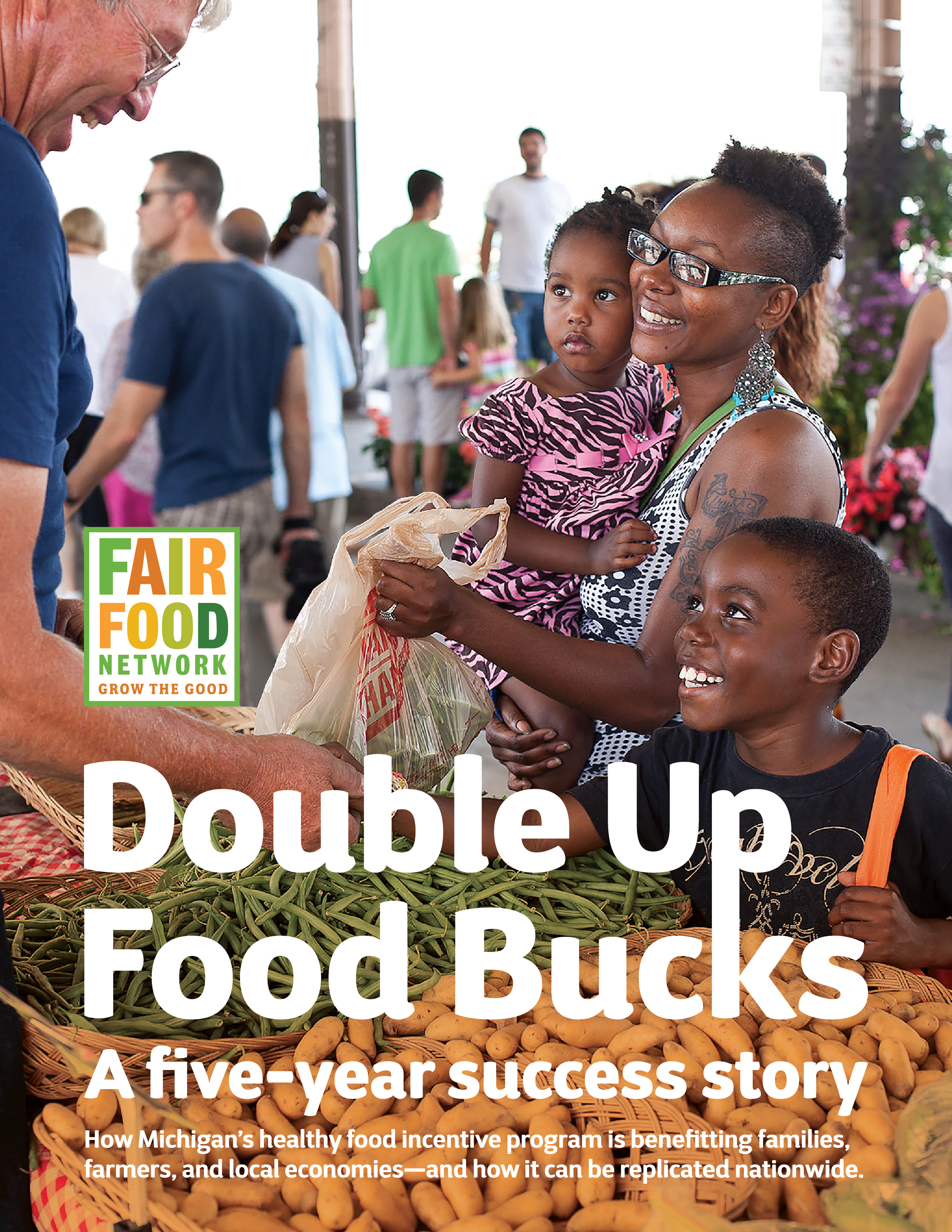New 5-Year Report Demonstrates Success & Scalability of SNAP Incentives
Data from Double Up Food Bucks demonstrates long-term success and scalability of SNAP incentives
New 5-year study of Michigan’s Double Up Food Bucks shows benefits to families, farmers, economy
AUG. 19, 2014 | ANN ARBOR, Mich.—A new five-year report released today by Fair Food Network shows that SNAP incentives offer a successful and scalable approach to increasing access to affordable, healthy food for low-income families, boosting farmer income, and strengthening local economies.

“The numbers show that offering incentives to use SNAP benefits for fresh produce works,” said Fair Food Network president and CEO, Oran Hesterman. “There should not be a question of whether we support hungry families or local farmers—we can do both, and we can do it nationwide.”
In five years, Fair Food Networks’ Double Up Food Bucks (Double Up) incentive program has benefited more than 200,000 low-income families and more than 1,000 farmers in 2013 alone, and has had a greater than $5 million effect on Michigan’s economy.
The data are drawn from evaluation of Double Up, which has grown from a small pilot in five farmers markets in Detroit to a statewide program in more than 150 sites including farmers markets, food share programs, mobile food trucks, and grocery stores across Michigan.
Although other SNAP incentive programs exist, Double Up is the only program to be rolled out with a consistent design and central coordination over a broad geographic area—which facilitates both robust evaluation and streamlined replication. This model also reduces the burden on markets and partners, so they can focus on what they do best—ensuring the program’s success in their communities.
Here’s how it works: when a family spends $10 in SNAP benefits (formerly known as food stamps) at a participating farmers market or grocery store, the family receives an additional $10 of Double Up Food Bucks to purchase Michigan grown fruits and vegetables.
The wins are three-fold: 1) families bring home more healthy food; 2) local farmers gain new customers, sell more produce, and make more money; and 3) more food dollars stay in the local economy.
The study, available online at fairfoodnetwork.org, includes these significant findings:
- More than 90 percent of SNAP recipients at farmers markets report eating more fruits and vegetables because of Double Up; more than 80 percent report buying fewer low-nutrition snacks.
- More than 1,000 farmers participated in Double Up in 2013; 90 percent report selling more fruits and vegetables, and 85 percent report making more money.
- With the statewide implementation of Double Up, Michigan has become one of the top five states in the nation for SNAP use at farmers markets and the highest in the Midwest. In 2013, eight percent of all SNAP sales at farmers markets took place in Michigan even though less than four percent of total SNAP recipients live in the state.
This year, Fair Food Network will work with three independent grocery stores in Detroit. It will also expand the Double Up program to Battle Creek and Grand Rapids in a new partnership with SpartanNash, a national food distributor and grocery chain headquartered in Michigan. This expansion follows a 2013 grocery store pilot in Detroit, one of the first in the nation to bring incentives to grocery stores.
“Moving Double Up into groceries across the state means we will reach more low-income families and help more Michigan farmers sell more produce to their neighbors,” Hesterman said.
The Agricultural Act of 2014, or Farm Bill, includes $100 million for the Food Insecurity Nutrition Incentive, a new grants program that will support communities to launch and expand programs like Double Up across the United States.
The Double Up model and associated tools have been compiled into a toolkit to support communities outside Michigan interested in starting a healthy food incentive program. The model is already inspiring others across the country with Double Up programs active in Tulsa, Oklahoma, and Western New York and others expressing interest.
“We have proven that SNAP incentives can be implemented statewide with benefits to consumers, family farmers, and the state’s economy,” said Hesterman. “We’re confident that resourceful partners in other states can use this model to serve hungry families and hardworking farmers across the nation.”
# # #
About Fair Food Network
Fair Food Network is a national nonprofit founded on the belief that vibrant local food systems can create health and economic opportunity for all. Headquartered in Michigan, we pioneer win/win/win solutions that support farmers, strengthen local economies, and increase access to healthy food—especially in our most underserved communities.
Dig deeper at fairfoodnetwork.org and join us on Facebook and Twitter @FairFoodNetwork and @OHesterman.







